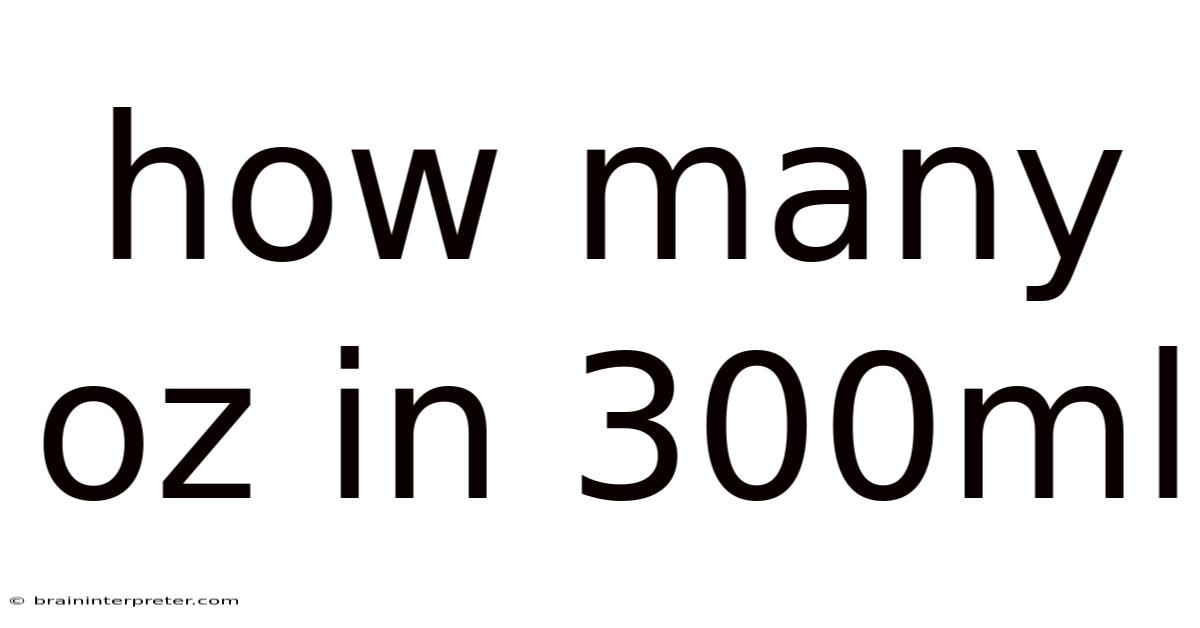How Many Oz In 300ml
braininterpreter
Sep 22, 2025 · 4 min read

Table of Contents
Decoding the Conversion: How Many Ounces are in 300ml? A Comprehensive Guide
Converting between milliliters (ml) and ounces (oz) can seem confusing, especially when dealing with recipes, medication dosages, or everyday measurements. This comprehensive guide will delve into the intricacies of converting 300ml to ounces, providing not only the answer but also a deep understanding of the underlying principles and practical applications. Understanding this conversion is crucial for anyone working with both metric and imperial measurement systems.
Introduction: Understanding Units of Volume
Before we tackle the conversion of 300ml to ounces, let's clarify the units involved. Milliliters (ml) are a unit of volume in the metric system, while ounces (oz) are a unit of volume in the imperial system. The metric system is based on powers of ten, making conversions relatively straightforward. The imperial system, however, is less consistent, leading to more complex conversions. This difference is why understanding the conversion factor is key.
The Conversion Factor: The Bridge Between ml and oz
The key to converting between milliliters and ounces lies in the conversion factor. One fluid ounce is approximately equal to 29.57 milliliters. This isn't an exact conversion; it's an approximation used for practical purposes. The slight variation stems from the historical development of these units and differing definitions of the ounce (fluid ounce vs avoirdupois ounce). For our purposes, we'll use this commonly accepted approximation.
Calculating 300ml to Ounces: A Step-by-Step Approach
Now, let's calculate how many ounces are in 300ml. We'll use the conversion factor mentioned above: 1 fl oz ≈ 29.57 ml.
Step 1: Set up the Conversion
We want to convert 300 ml to ounces. We can set up a proportion:
300 ml / x oz = 29.57 ml / 1 oz
Step 2: Solve for x
To solve for 'x' (the number of ounces), we can cross-multiply:
300 ml * 1 oz = 29.57 ml * x oz
300 = 29.57x
Now, divide both sides by 29.57:
x = 300 / 29.57
Step 3: Calculate the Result
Performing the calculation, we find:
x ≈ 10.18 oz
Therefore, approximately 10.18 fluid ounces are in 300 milliliters.
Precision and Rounding: Understanding the Limitations
It's crucial to understand that this is an approximate conversion. Depending on the context, you might round the result to a more manageable number. For cooking, rounding to 10 ounces might be sufficient. For precise measurements in medicine or scientific experiments, the extra decimal places are more relevant. Always consider the level of precision needed for your specific application.
Practical Applications: Where This Conversion Matters
Understanding how to convert 300ml to ounces has practical implications in various areas:
- Cooking and Baking: Many recipes use both metric and imperial units. Knowing this conversion allows you to easily adapt recipes regardless of the original measurement system.
- Medicine: Medication dosages are often specified in milliliters or ounces. Accurate conversion is crucial for safe and effective medication administration.
- Travel: When traveling internationally, you might encounter different measurement systems. Being able to convert between ml and oz ensures you can understand labels and quantities correctly.
- Science and Engineering: In fields involving fluid measurements, accurate conversion between milliliters and ounces is essential for consistent results.
- Everyday Life: From understanding drink sizes to checking the volume of household liquids, this conversion can be surprisingly useful in everyday life.
Beyond 300ml: Mastering the Conversion Process
The process outlined above can be applied to convert any volume from milliliters to ounces. Simply replace 300 with your desired milliliter value and follow the same steps. For example, to convert 500ml to ounces:
- Set up the proportion:
500 ml / x oz = 29.57 ml / 1 oz - Cross-multiply:
500 = 29.57x - Solve for x:
x = 500 / 29.57 ≈ 16.91 oz
Frequently Asked Questions (FAQs)
Q: Is the conversion from ml to oz always exact?
A: No, the conversion is an approximation because the relationship between milliliters and ounces isn't a whole number. The precision depends on the conversion factor used.
Q: What's the difference between fluid ounces and avoirdupois ounces?
A: Fluid ounces measure volume (liquids), while avoirdupois ounces measure weight or mass. They are distinct units and cannot be directly interchanged. We've focused on fluid ounces in this conversion.
Q: How can I convert ounces to milliliters?
A: To convert ounces to milliliters, simply reverse the process. Multiply the number of ounces by 29.57 to get the approximate equivalent in milliliters.
Q: Are there online converters available?
A: Yes, many websites and apps provide convenient online converters for various units, including milliliters and ounces. These tools can be helpful for quick conversions. However, understanding the underlying principles is still beneficial.
Conclusion: Mastering a Crucial Conversion
Converting between milliliters and ounces is a fundamental skill with practical applications across numerous fields. By understanding the conversion factor and the steps involved, you can accurately convert between these units, ensuring precision in your measurements and calculations. Remember to always consider the context and the level of precision needed when rounding your results. With practice, this conversion will become second nature, empowering you to confidently navigate both metric and imperial systems of measurement.
Latest Posts
Latest Posts
-
Convert 102 Cm Into Inches
Sep 22, 2025
-
155 Cm To Inches Height
Sep 22, 2025
-
52 Acres To Sq Ft
Sep 22, 2025
-
1000 Grams Water To Cups
Sep 22, 2025
-
3 Oz Sugar To Cups
Sep 22, 2025
Related Post
Thank you for visiting our website which covers about How Many Oz In 300ml . We hope the information provided has been useful to you. Feel free to contact us if you have any questions or need further assistance. See you next time and don't miss to bookmark.